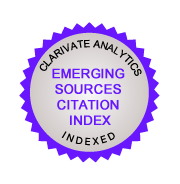Francesco Messina. Scultore dell’umanesimo. Ensayo de Eugenio D’Ors sobre un artista mediterraneísta
DOI:
https://doi.org/10.5944/etfvii.22-23.2009.1432Palabras clave:
Eugenio D’Ors, Francesco Messina, escultura, Italia, sculpture, Italy,Resumen
La publicación de un libro sobre el escultor italiano Francesco Messina en el año 1949, sirve en este artículo para analizar los intereses italianizantes de su autor, Eugenio D’Ors, la recepción crítica que este ensayo tuvo en Italia y su importancia en el análisis y estudios posteriores de la obra de este artista. This article takes the publication of a book about Italian sculptor Francesco Messina in 1949 as a starting point to examine the Italian inspired interests of its author, Eugenio D’Ors, the critical reception of this work in Italy and its impact on later studies concerning this artist’s oeuvre.Descargas
Los datos de descargas todavía no están disponibles.
Descargas
Publicado
2011-01-01
Cómo citar
Ara Ferández, . A. (2011). Francesco Messina. Scultore dell’umanesimo. Ensayo de Eugenio D’Ors sobre un artista mediterraneísta. Espacio Tiempo y Forma. Serie VII, Historia del Arte, (22-23). https://doi.org/10.5944/etfvii.22-23.2009.1432
Número
Sección
MISCELÁNEA
Licencia
Los autores que publican en esta revista están de acuerdo con los siguientes términos:
- Los autores conservan los derechos de autor (copyright) de las obras publicadas y garantizan a la revista el derecho de ser la primera publicación del trabajo al igual que permiten la reutilización del mismo bajo la licencia de uso indicada en el punto 2.
- Las obras se publican en la edición electrónica de la revista bajo bajo una licencia Creative Commons Reconocimiento-NoComercial 4.0 Internacional, que permite a otros compartir el trabajo con un reconocimiento de la autoría del trabajo y de la publicación inicial en esta revista. Se pueden copiar, usar, difundir, transmitir y exponer públicamente, siempre que: i) se cite la autoría y la fuente original de su publicación (revista, editorial y URL de la obra); ii) no se usen para fines comerciales.
- Se permite y se anima a los autores a difundir electrónicamente las versiones pre-print (versión antes de ser evaluada) y/o post-print (versión evaluada y aceptada para su publicación) de sus obras antes de su publicación, ya que favorece su circulación y difusión más temprana y con ello un posible aumento en su citación y alcance entre la comunidad académica (por ejemplo, en repositorios institucionales o en su propio sitio web). Color RoMEO: verde. (Véase The Effect of Open Access) (en inglés).










